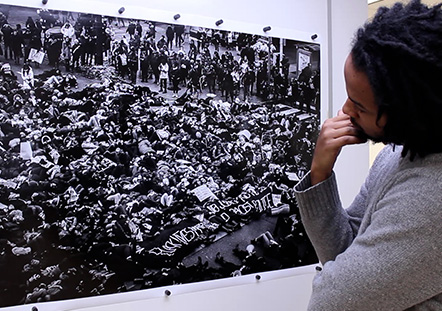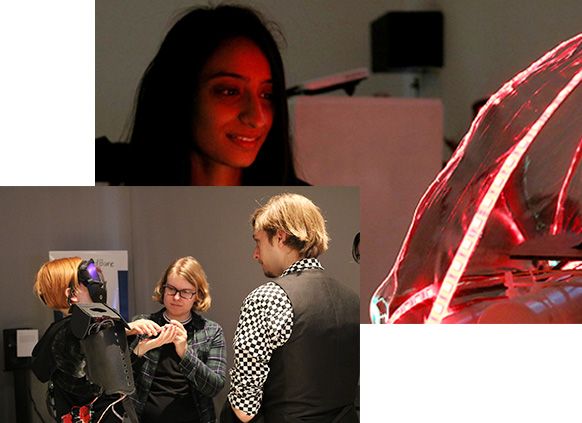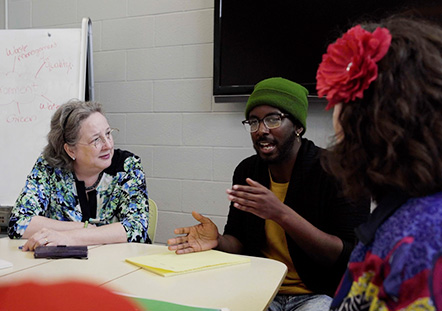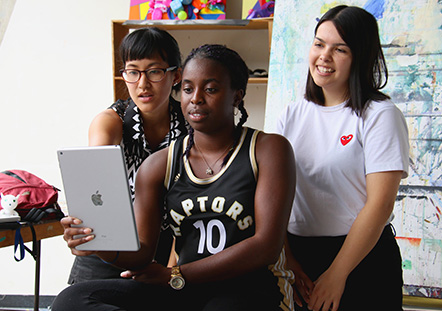Integrative Arts
Arts | Technical Skills | Community/Social Justice | Action
Integrative Arts, combines artistic and technological skills with an emphasis on artistic and creative methodology, transdisciplinary study of the arts, and engagement in the creative industries, all taking place within a social justice and decolonial framework.
The program responds to changing student demand and industry needs by facilitating individualized student pathways through the program and culminating in collaborative capstone projects.
Program overview
This structure prepares a wide range of students for professional success within changing fields by foregrounding not only techniques within disciplines but also the skills to communicate and collaborate across fields and to adapt to dynamic conditions. The revisions will allow students to pursue a course of study that blends shared foundational courses with individualized programs of study across the School of Arts, media, Performance, and Design. For instance, the Integrative Arts program would offer a potential avenue for the contemplation and celebration of racial identity through intersections between areas of Screen Dance, Digital/Electronic Music and Digital Performance being developed across the Departments of Music, Dance and Theatre.


Most importantly, the decolonization of knowledge and methods is part and parcel of the social justice framework within which this program is grounded. This approach enables a reimagining of creative practice and theorization which does not center white, Western approaches, but places them in dialogue within a range of culturally diverse epistemologies [ways of knowing]. The ambition of the program to have a meaningful engagement with social justice and to maintain a social justice framework requires constant self-reflection and refinement to carry-out these goals.
It is fully expected that the hybrid practices which will emerge out of the Integrative Arts program will be significant insofar as they allow themselves to be continually challenged and revised by diverse perspectives, including those of Black, Indigenous, Latinx, Asian, near and Middle Eastern, and perspectives by people of colour with intersectional attention to feminist, queer, trans, and critical disability studies, among others. The emphasis of this program is its dynamism both for students within the program and beyond as they apply the learned principles to create positive change in their communities.

Program Highlights

Learn Tech Skills:
Gain a foundation in design.

Be an Innovator:
Experiment with new methods of storytelling and artsmaking, using a combination of artistic mediums.

Make a Difference:
Challenge the orthodoxies of the arts industries with projects focused on advocacy and social justice.
GRADUATE REQUIREMENT
Specialized Honours BFA Program in Integrative Arts (Studio)
A program core of 30 credits that consists of the following:
- FA/PANF 1100 3.0, Introduction to Creative Methodologies I
- FA/PANF 1110 3.0, Introduction to Creative Methodologies II
- FA/PANF 2100 3.0, Research Creation; Processes and Practices for Artist
- FA/DATT 2400 3.0, Creative Coding I
- FA/MUSI 2002 3.0, Introduction to Entrepreneurship for Artists
- FA/PANF 3100 3.0, Ethics in the Arts: Creative Practice, Social Justice, and the Creative Industries
- FA/ARTH 3999 3.0, New Media Art
- FA/PANF 3999 3.0, Collaborative Project
- FA/PANF 4999 6.0, Capstone
33 studio course credits, and 21 studies course credits in AMPD with a minimum of 18 credits in one area (excluding core courses) [Cinema and Media Arts, Computational Arts, Dance, Music, Theatre, Visual Art and Art History], including 18 credits at 3000-level and 18 credits at 4000-level. Of the 4000-level credits, at least 6.0 should be in one area.
Note: some courses in each cluster will be required for upper level courses.
12 credits electives 6 credits FA/xxxx 1900
18 credits general education (Social Science 6.0, Natural Science 6.0, and Humanities 6.0)
AREAS OF CONCENTRATION
By encouraging students to inhabit new territories opened up by the intersection of technology and art practice, this program provides a technical and conceptual toolbox that is not only relevant to their everyday lives but will also demonstrate how their work as creative artists can ensure that emerging industries develop in ethical and socially responsive ways.
From a shared foundation in methodology, research-creation, entrepreneurship, and ethics in the arts, students then focus in one or more areas of expertise chosen from course offerings in Cinema and Media Arts, Computational Arts, Dance, Music, Theatre, and Visual Art and Art History. This foundation will support and inform their shared work in a third year collaborative project course and culminating capstone projects. Within these project courses, students work collaboratively to address transdisciplinary challenges in the creative industries, the community, and beyond.
The following is a list of example courses that students in Integrative Arts can take to satisfy the degree requirements for their degree. This list will be amended and updated in consultation with participating units. We anticipate that this list will continually grow as the program matures and becomes part of the fabric of AMPD.
ADMISSION REQUIREMENTS
The BFA in Integrative Arts aims to provide access and encourage students who have knowledge and experience outside of traditional art training to explore new directions in arts, creative industries, and decolonial / social justice based work.
- Integrative Arts applicants need to meet the requirements needed for acceptance into any program at York.
- An upper level arts course taken in High School is encouraged, but not required.
- No portfolio is required.
Career paths
The beauty of your program design is that it isn’t a conveyor belt to a job; it’s a tool kit to navigate changing fields and to bring added value to any number of industries, including tech, business and beyond!
